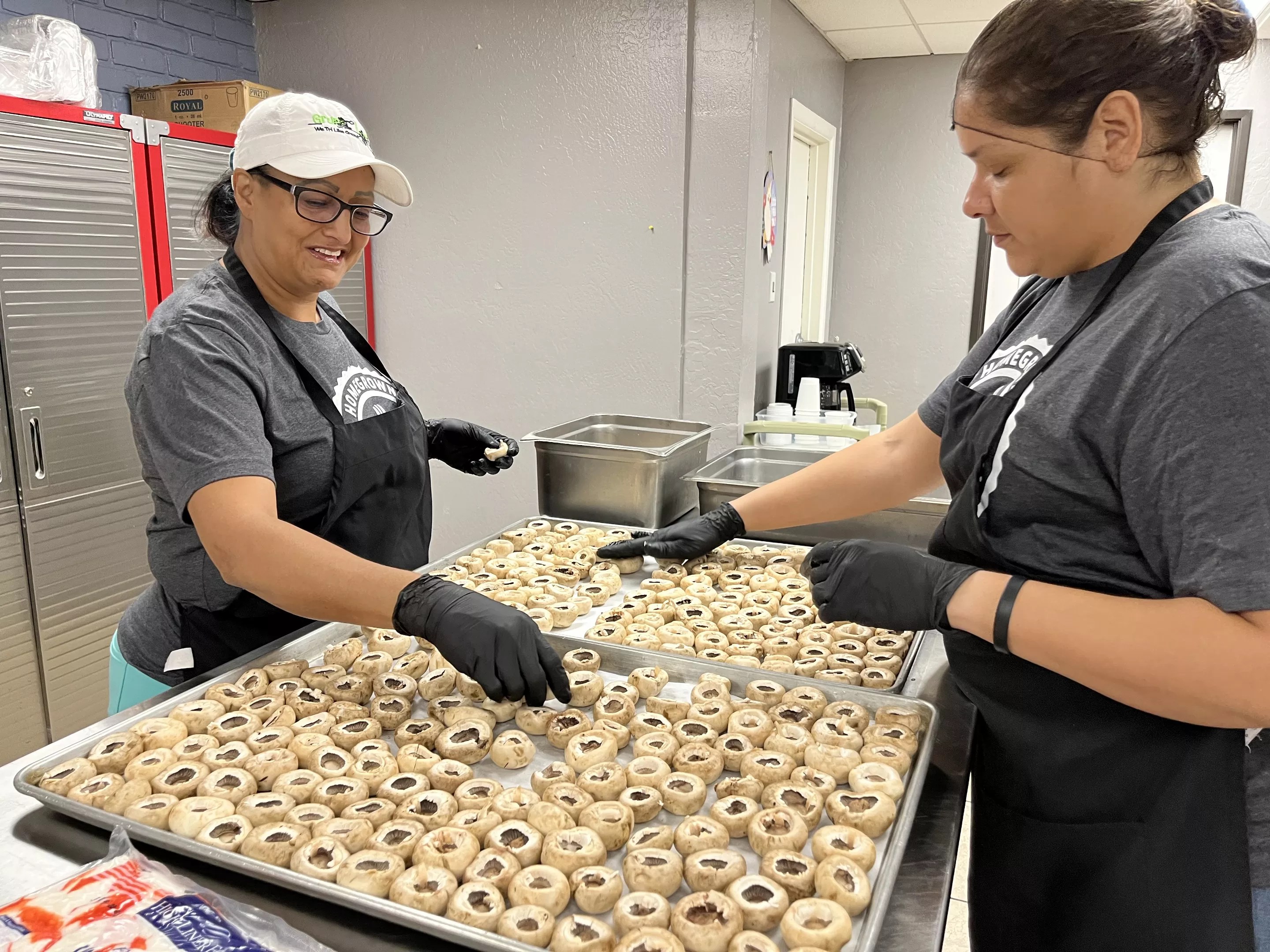
Georgann Yara

Audio By Carbonatix
At a fast-casual restaurant in east Phoenix, the breakfast-all-day menu boasts perennial favorites such as avocado toast and chilaquiles alongside lunch-friendly items, including hot and cold sandwiches, salads, tacos and carne asada fries.
In the bright, open dining area, a cold case filled with take-and-heat ziti, chipotle chicken wraps, grilled vegetable pasta salad and frescas con crema are prepped for customers who wish to take their sustenance to go. Butterscotch blondies, snickerdoodles and zucchini muffins filled with cream cheese are among the 10 selections in the baked goods case next to the register.
Everything is made fresh daily steps away in the commercial kitchen, and a barista stands behind the counter, on call for made-to-order Starbucks pick-me-ups.
At first blush, nothing seems distinctive about this breakfast and lunch spot. Yet its ownership, the team that runs it and where its revenue goes are.
Helpings Cafe opened at UMOM New Day Centers in 2014. In its early years, it was seen as an extension of United Methodist Outreach Ministries and a proving ground for students of the nonprofit’s Homegrown Training Program, which provides training in restaurant hospitality and assists with job placement.
Recently, however, Helpings has earned its own identity as a neighborhood gathering spot for breakfast and lunch, a locale for business meetings and a reliable eatery for the UMOM campus’s 100 or so employees and residents.
Over the past couple of years, the cafe has evolved into a crucial revenue source for the shelter, which provides resources for single women and families experiencing homelessness.
“It’s such a unique thing for a nonprofit to have a social enterprise of their own, a revenue generator, source of income … and UMOM has nailed it,” says Eric Sperling, CEO of The Social Television Network, a catering client of more than a year.
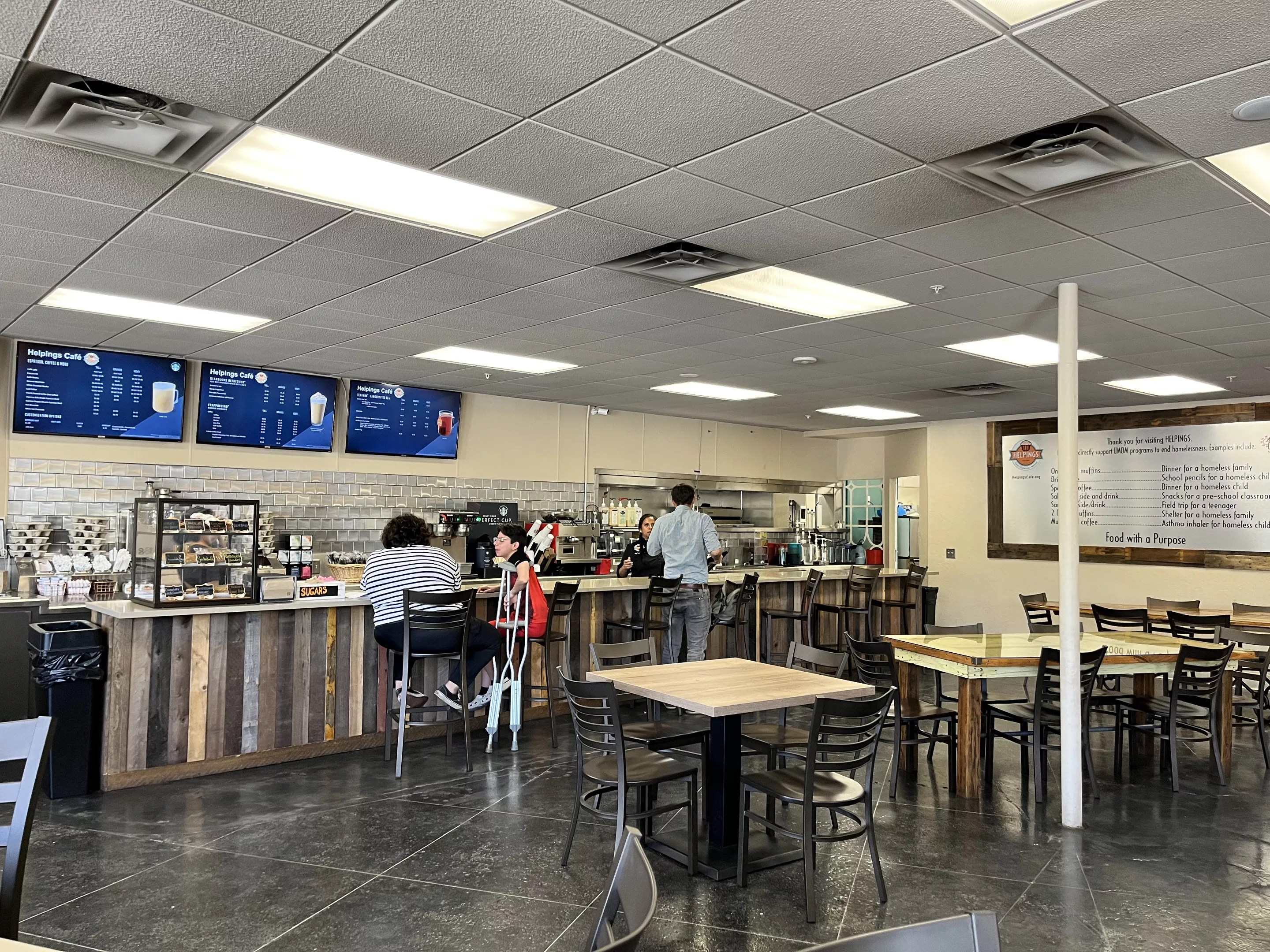
The Helpings Cafe serves about 100 UMOM employees and residents for breakfast and lunch every weekday.
Georgann Yara
Generating revenue by pushing boundaries
The six-week culinary Homegrown Training Program runs year-round and is open to anyone in UMOM housing.
A team of professional chefs teach students front and back of the house jobs ranging from customer service to food prep and cooking. The barista program utilizes Starbucks coffee, espresso and tea, with students learning how to make the chain’s most popular beverages.
Each cohort comprises 10 students who are selected after an application and interview process. At the end of the program, they are honored with a graduation ceremony, and each graduate receives a knife kit, chef’s coat and certificate. Students are not paid for their on-the-job training but receive a $250 Visa gift card at the three-week mark and another on completion.
Helpings Cafe was the brainchild of former UMOM CEO Darlene Newsome, who retired in 2020 after 18 years of helming the nonprofit.
The restaurant and catering menus initially featured simple breakfast dishes, salads and sandwiches. But after the pandemic hit, followed by ensuing months of adjusting to a new normal, the catering side took off with board members and associates of UMOM requesting food for meetings and small dinner parties with those in their bubbles, explains UMOM COO Monique Lopez.
Around the same time, the catering division was awarded an 18-month contract with Maricopa County to provide meals for people in county hotels who tested positive for or were at risk of contracting COVID-19. This, Lopez says, was the first time the team realized they could enter into catering contracts.
With each new opportunity, Helpings’ personnel grasped how much they were capable of and that the only obstacle was uncharted territory.
“All of the rules we put on ourselves for no reason came off during that time,” Lopez says.
Soon, they were fulfilling any request. From bacon-wrapped shrimp and chicken wings to brunch for 150 people with food served in elegant chafing dishes, private parties and evening events, nothing was off the table.
Regular catering clients continued to push boundaries with their requests, and the students continued to deliver.
The Social Television Network hires the cafe to provide passed appetizers for monthly happy hour and mingling events that draw community and city leaders. Its requests for sophisticated and out-of-the-box dishes were among the first that encouraged the Helpings team to stretch.
Mini barbecue chopped salad shooters, shredded beef taquitos with avocado cream and house-made chips are among the popular bites, says Sperling, whose Phoenix-based network focuses on nonprofits and community leaders’ charitable efforts.
“You think of the community impact with its mission, but you don’t anticipate the food to be amazing,” Sperling says. “But the food comes and you go, ‘Oh my gosh, it’s incredible!'”
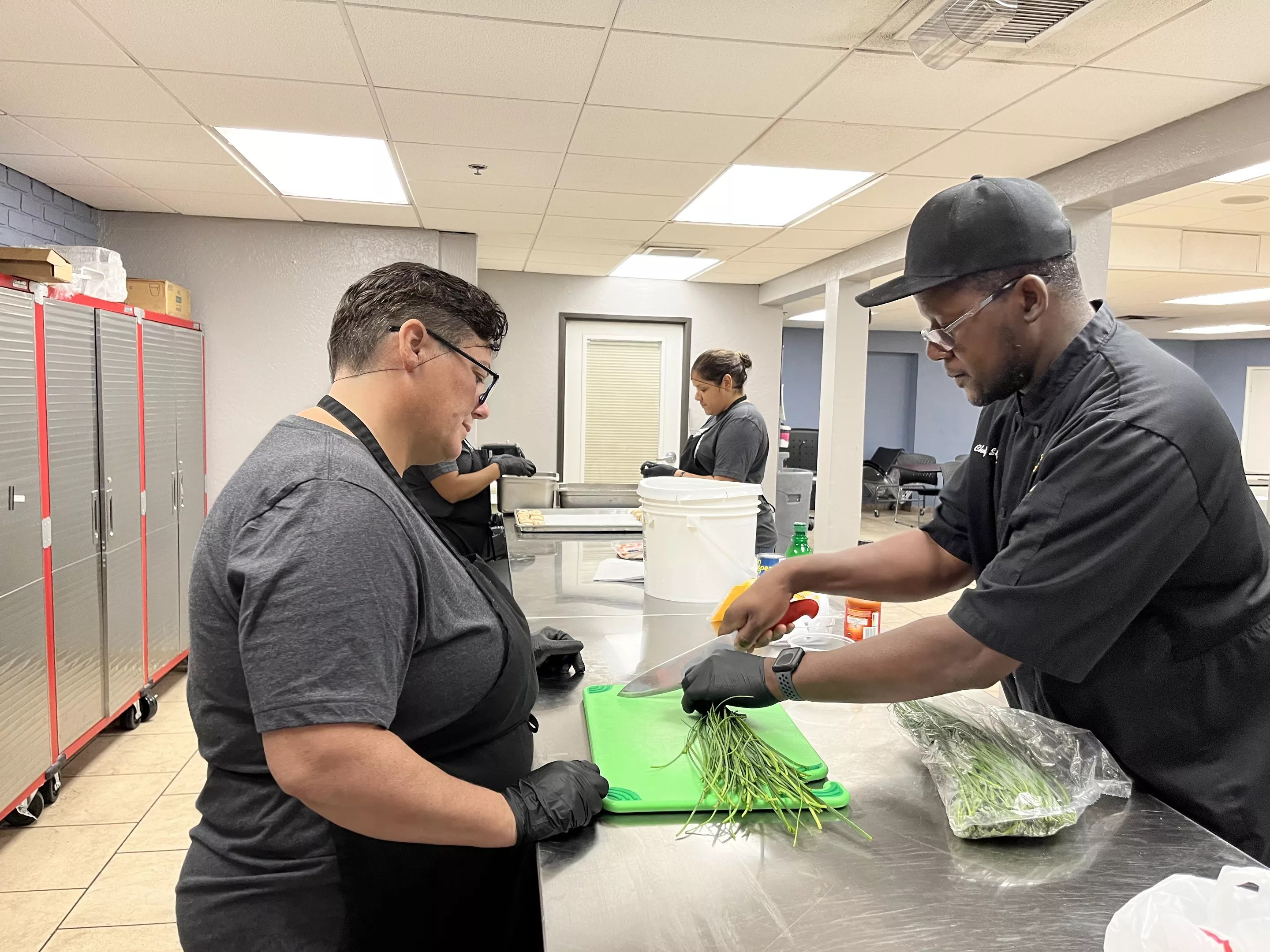
Steven Wimbley, chef instructor and training coordinator for UMOM New Day Centers’ Homegrown Training Program, shows a student how to chop chives.
Georgann Yara
A path to joining the workforce
Helpings quickly gained its own brand and identity. Today, about 40% of Helpings’ business comes from catering, which includes several contracted jobs, Lopez says. Helpings went from making zero money to being on track to generate $100,000 in revenue this year, with every dollar going back to UMOM.
About 90% of students complete the program, and there’s a similar success rate for getting a job within 30 days of graduation, says Edwin Jimenez, director of social enterprise.
Together with chef instructor Steven Wimbley, Jimenez works on improving menus and proper pricing to make the program run efficiently. They ask clients for feedback on how to get better, which has helped create many return customers, Jimenez says.
“We want to put our best foot forward,” Jimenez says. “Whatever you need, we’re doing it. It’s an exciting time.”
Over the last year, Kind Hospitality, a Tempe-based restaurant management group that oversees several brands throughout the state, has partnered with UMOM for job interviews and referrals of program alumni. In that time, the company has hired about a dozen graduates to fill culinary and barista positions at some of the 11 restaurants under its umbrella, says Derek Boettcher, executive VP of operations for Kind.
Several have a presence at Phoenix Sky Harbor International or Phoenix Mesa Gateway airports, like Panera Bread, Macayo’s Mexican Food and Infusion Coffee & Tea. Most of Kind’s hires from UMOM are for airport jobs spanning customer service, quality control, building sandwiches at Panera and making specialty java drinks for Infusion.
With their education and training, program graduates start off on a much better foot than many of the other applicants Kind sees, Boettcher says.
“We think this partnership has been highly successful. We have a couple of superstars. Considering what they’ve gone through in their personal lives, what they’re doing is tremendous,” Boettcher says. “It’s a worthwhile program and we’re thrilled to be part of it.”
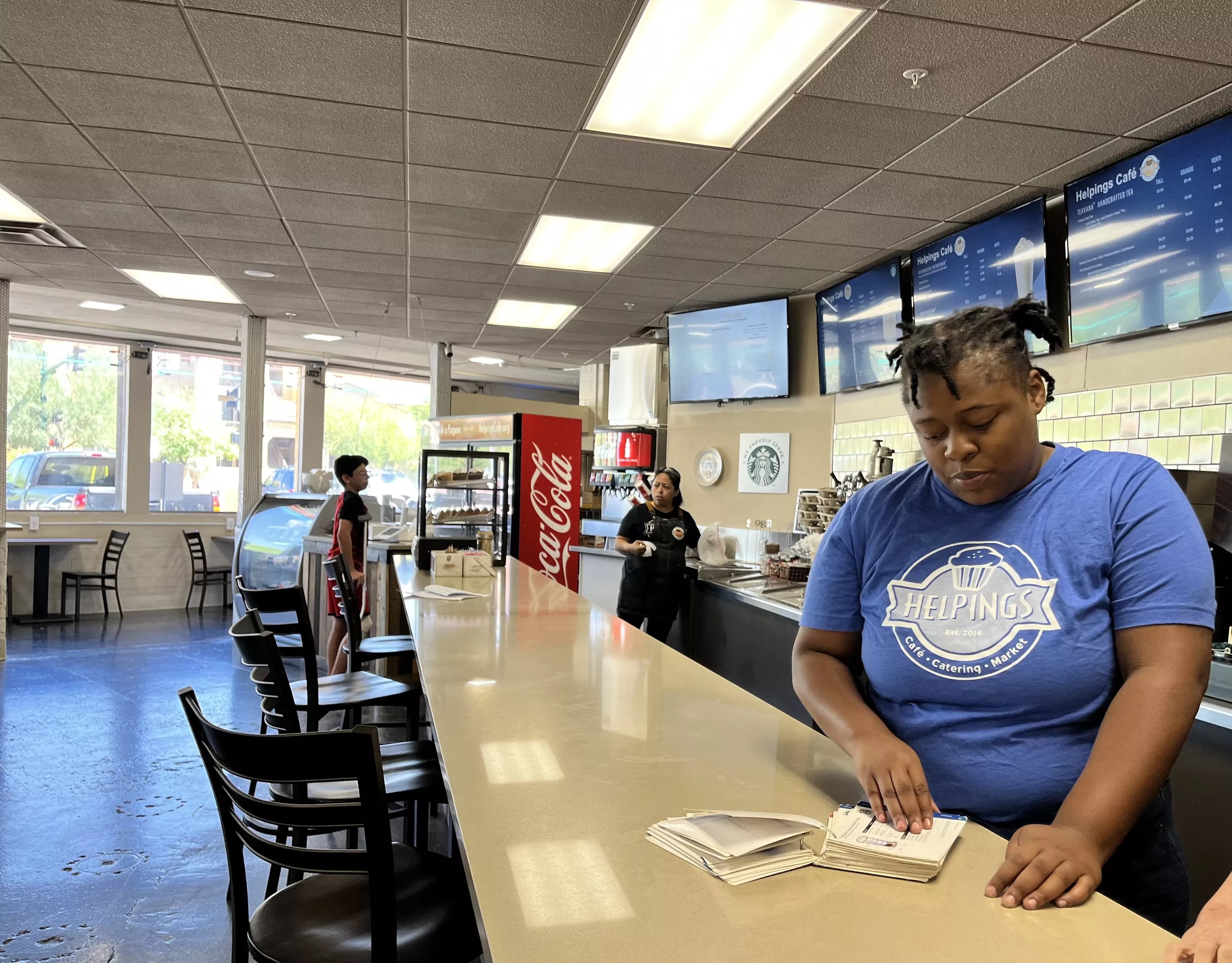
Barista Breanna Friston goes over Starbucks beverage recipes at Helpings Cafe. Friston is one of the culinary program’s graduates employed at the restaurant.
Georgann Yara
Learning the ropes, feeling ‘like an equal’
On a weekday morning in the commercial kitchen, Wimbley looks on as students slice jalapeños, chop thick-cut bacon and prep white button mushrooms that will be stuffed with crab for the current class’s graduation ceremony.
One student chops chives following a demonstration from Wimbley.
“He’s teaching us how to chop correctly. You don’t just chop the knife straight down. You need to rock it back and forth,” says Marla, who requested that we use her first name only, while demonstrating the technique. A career in hospitality interests her, however not necessarily a job in the kitchen. “But it’s important to be able to do what everyone else has to do.”
To Marla’s left, two of her classmates are on mushroom duty. One of them, Mercedes Sandoval, has a part-time job as a prep cook at Arizona State University. After she graduates, it will become a full-time gig.
Her mushroom prep partner Sophia Leon has just started the program but has a goal firmly in sight.
“I want to work in a restaurant, work my way up and eventually own my own restaurant,” Leon says. “I love this.”
Full-time barista Breanna Friston is among the 60% of Helpings’ staff who are program graduates. On this morning, she is training new students on how to make Starbucks beverages.
In April, Friston graduated from the program after learning cooking and barista duties. That same month, she moved out of UMOM housing and into her own place in Scottsdale, where she lives with her wife and three children, ages 6 years, 3 years and 6 months.
Friston was eight months pregnant when she entered UMOM housing. After her son was born, she went to an informational meeting and decided to enroll in the program.
“I just moved to UMOM, and I was new to the whole shelter living situation. It let me out and (to) do something productive,” Friston says. “Edwin and chef Wimbley, they treated me like an equal. They didn’t treat me like I was in a shelter. It felt like a home away from home.”
After moving out, Friston entered the workforce but missed her UMOM family. When she found out there was a barista opening at Helpings, Friston applied for and got the full-time position.
“My coworkers are pretty chill. It’s a good job with good pay,” Friston says. “I see myself here for a long time.”
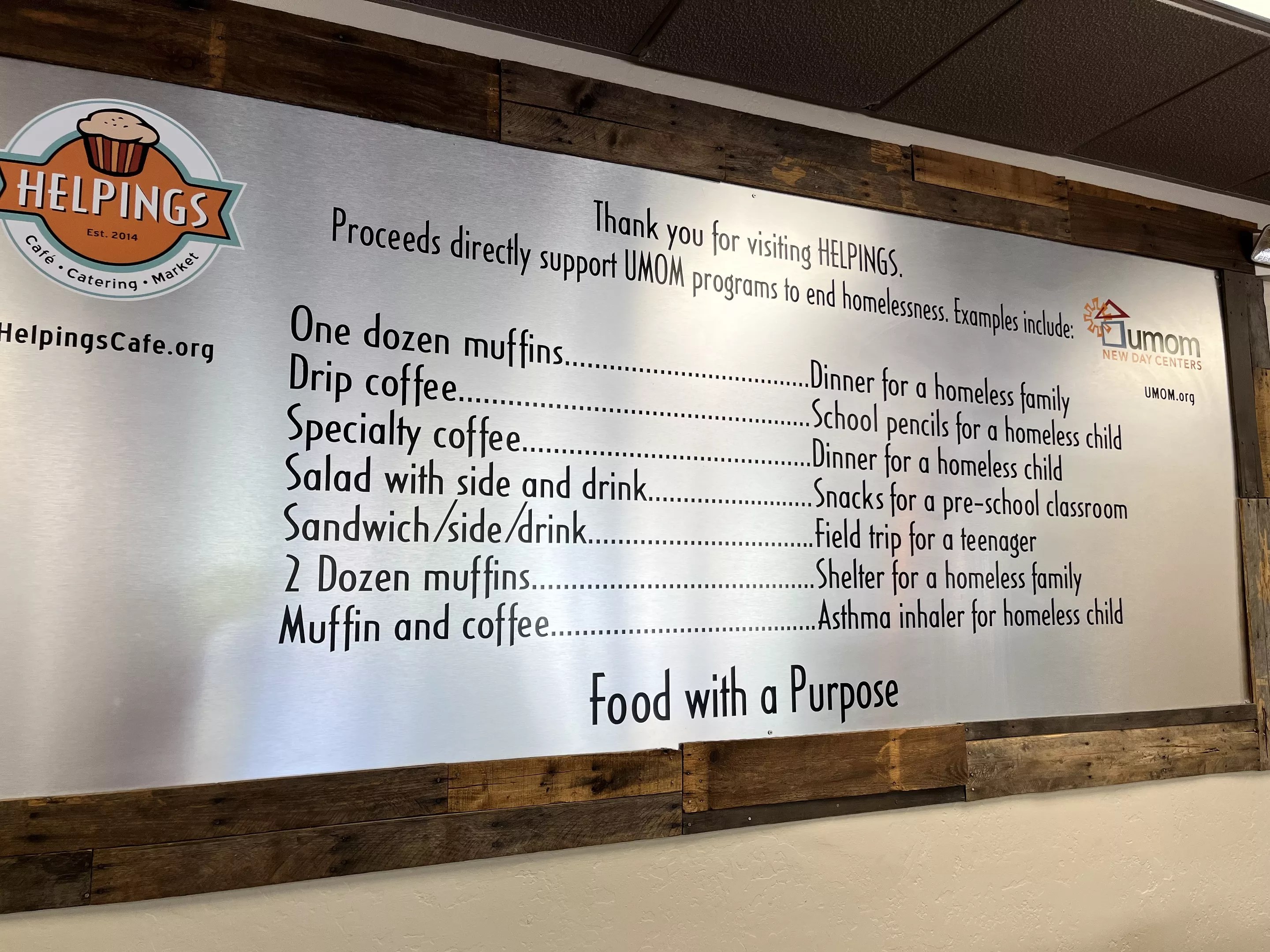
This menu at Helpings Cafe shows customers what their purchases fund at UMOM New Day Centers.
Georgann Yara
Finding the light
Alfonso Reyes works nearby and has been a Helpings Cafe regular for the last year, stopping by almost daily for his coffee and the occasional bite.
He’s tried just about every item on the menu but says he also enjoys the friendliness of the employees.
“When you find a place where the people are great and the food’s good, it’s one spot you want to go back to,” he says.
Chef instructor and catering manager Dora Luz Lira has been with UMOM’s culinary program for seven years. When she travels, she sometimes runs into alumni working at various restaurants at the airport.
“Sometimes you wonder what happens after they’ve left the program,” Lira says. “It feels great to see them out.”
As Friston moves behind the counter and teaches the rookies how to make Starbucks Refreshers, it’s evident she feels right at home and, at least for now, is where she is meant to be.
“When you’re in a shelter, you’re stressed, depressed, wondering what’s next. They gave me something to smile about and look forward to,” Friston says. “I never saw that my life could have a light at the end of the tunnel, but I ended up finding that light… For anyone who’s in that place, as long as you stay with it, you can find that light.”
Helpings Cafe and Catering
3333 E. Van Buren St.